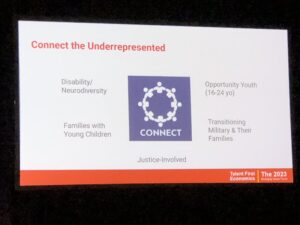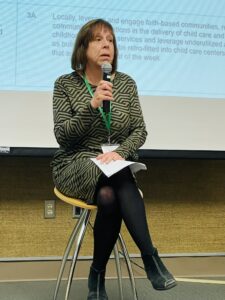This year’s Emerging Issues Forum, hosted by the Institute for Emerging Issues (IEI) at North Carolina State University, explored strategies to overcome barriers to employment faced by many North Carolinians. While unemployment in NC is low at about 3.9%, adjusting for underemployed or those voluntarily working part-time, that rate jumps to 8.4%, among the highest in our region.

With a focus on five underemployed groups, Forum participants learned about challenges facing these particular groups, strategies that have brought success, and considered new solutions to break down barriers. By identifying and addressing these barriers, people can find meaningful employment, build financial stability, and help alleviate worker shortages. These barriers to work, can be as concrete as lacking transportation or child care, to more intangibles, such as employer stigmas about hiring people from some underemployed groups.
The five underemployed groups that Talent First Economics has focused on are:
- Parents and caregivers of young children
- Transitioning military veterans and their families
- Those who are justice involved
- Opportunity youth (ages 16-24, not in school or working)
- Those with disabilities / neurodiversity
Opening the Forum with a level-setting analysis of the country’s labor shortage, Laura Dawson Ullrich, economist for the Federal Reserve Bank of Richmond, highlighted what’s behind the shortage and shared employment trends for the future. She noted that labor participation will be difficult to grow due to Baby Boomer retirements, changes in attitudes and norms around work and the steep decline in the birthrate. Ullrich also identified three other issues holding back workforce participation – the opioid epidemic, child care, and criminal records.
Throughout the day, panels and breakout groups were inspired to hear and consider solutions to overcome employment barriers for underrepresented groups including: the use of social impact finance to provide more access to post secondary education; upskilling, reskilling and work-based learning; changing regulations, culture norms and addressing liability concerns; and creating people-first workplaces, which provide benefits such as paid parental and family medical leave and child care supports for working families.
Forum Addresses Family-Friendly Benefits for Workforce Engagement

The February Forum was the culmination of a Task Force convened in the fall of 2022, composed of North Carolinians with both lived experience and subject matter expertise. The Task Force was divided into working groups to more thoroughly understand the extent of the barriers, highlight best practices and identify opportunities to improve workforce participation.
Lisa Finaldi, Community Engagement Leader at NCECF and co-leader of the Family Forward NC initiative, served on the Task Force and working group on parents and caregivers with young children.
“Everyone needs to be at the table to address the child care needs of working families. It’s not just the domain of human services, it’s about education, economic development, financial stability and mobility, and the hopes and dreams of parents and caregivers,” said Finaldi.
The parents and caregivers with young children working group began their exploration with acknowledgement that only 3.4% of North Carolina families have a parent who stays home to care for children full time.
Task Force Recommendations Related to Early Childhood
Data on the state of children and families in NC, the child care workforce, child care availability and cost, access to family-friendly workplace benefits, and more, set the stage for the working group’s recommendations for families with young children, which included:
- Convening stakeholders to explore how our state’s economic development programs can incentivize employers to support families in their workforce; create and pilot a program.
- Leveraging local partnerships, especially public-private partnerships to identify:
- Opportunities to support the child care industry, such as cost-sharing models for providers (e.g., administrative services, teacher training, discounts on large supply orders, etc.)
- Underutilized, physical assets, such as buildings and buses, to support and expand existing child care programs and identify opportunities to open new ones
- Address salary and wage inequality for early childhood educators. In addition to existing efforts:
- Research child care delivery models in other states and locally in NC to test some as a precursor to creating a sustainable business model
- Address regulations that are barriers to child care programs, especially for home child care providers
- Allow state funding to be used to support licensure for home-based child care programs
- Engage employers and economic development organizations about how they can support ongoing efforts to address inadequate compensation for the early childhood workforce (e.g., sample salary scale, raising the subsidy market rate, TEACH, WAGE$, and AWARD$ programs, etc.)
- Build the pipeline of dual language early learning educators entering the field.
“[Solving] the child care crisis means seeing it as a triple threat,” said NC Governor Roy Cooper, in his afternoon remarks. Children are learning as babies, parents need to work, employers need parents and caregivers to work.
Moving from Emerging Issues Ideas to Action for NC Economy
All of the Institute for Emerging Issues Task Force recommendations can be found online here. IEI will now take ideas from the Talent First Economics Task Force and Forum participants and move from ideas to action. This includes co-hosting regional meetings to highlight what happened at the Forum. The teams will share their plans, incorporate feedback, and consider next steps.
Family Forward NC is an innovative initiative to improve children’s health and well-being and keep North Carolina’s businesses competitive. It is a business-led change to increase access to research-based, family-friendly practices — big and small — that improve workplace productivity, recruitment and retention; grow a strong economy; and support children’s healthy development. The FFNC team encourages all employers to consider becoming a Family Friend NC Certified employer, which assists in recruiting and retaining happier, healthier employees.
The NC Early Childhood Foundation is driven by a bold – and achievable – vision: Each North Carolina child has a strong foundation for life-long health, education, and well-being supported by a comprehensive, equitable birth-to-eight ecosystem. We build understanding, lead collaboration, and advance policies to ensure each North Carolina child is on track for lifelong success by the end of third grade.
